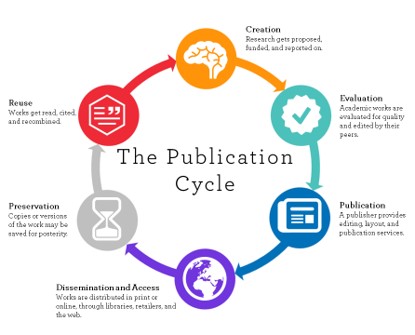Introducing ‘Issues in Scholarly Communication,’ Drexel Libraries’ New Online Column
March 3, 2020
Column Editor: Larry Milliken, Scholarly Communications Manager
Scholarly communication certainly isn’t new. Nearly 20 years ago, in 2003, the Association of College and Research Libraries (ACRL) defined it as “the system through which research and other scholarly writings are created, evaluated for quality, disseminated to the scholarly community, and preserved for future use. The system includes both formal means of communication, such as publication in peer-reviewed journals, and informal channels, such as electronic listservs.”
It is essentially the process of how scholarship is shared. Traditionally, the scholarly communication system includes books, journals, and conferences. However, new and emerging publication types, like data sets and digital scholarship, and alternative publication models, such as open peer review systems and direct to repository publication, are changing the scholarly communication system, providing alternative ways for scholars to share new knowledge. The Publication Lifecycle, University of Winnipeg Library, CC-BY License
The Publication Lifecycle, University of Winnipeg Library, CC-BY License
As scholarly communication continues to evolve, so has the Drexel Libraries’ program and services dedicated to helping the Drexel community navigate this important field.
This year, we are reaffirming and evolving our commitment to enhancing the campus community’s knowledge of emerging topics around scholarly communication. We have already increased our outreach in key areas such as Open Access, particularly encouraging use of Open Textbooks, and research data management support, with more to come.
Practitioners of scholarly communications often refer to the concept of the “Publication Lifecycle” to describe the system starting from the point of seeking and securing funding of a research project, to the use, citation, and reuse of the final, published scholarship. Over the coming months, we plan to address these issues through events, webinars, and online tutorials and guides. Not to mention this occasional online column dedicated to all things scholarly communication.
Stay tuned for more.